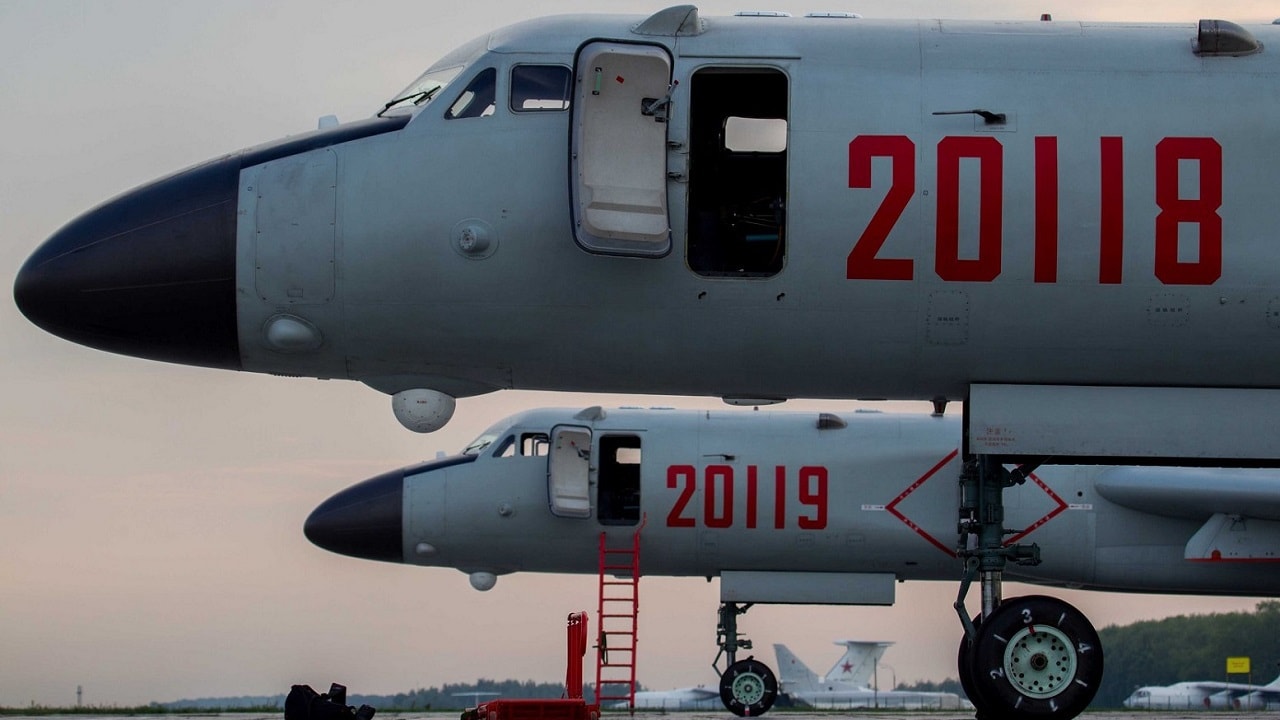Coincident with China’s Army Day, Beijing rolled out the “Red” carpet for Speaker Pelosi’s visit to Taiwan by launching live-fire drills, sending fighter jets into the Taiwan Strait, announcing missile tests in zones encircling Taiwan, and unleashing a tirade of wolf warrior threats of dire consequences to follow for the U.S. and Taiwan.
All of this would seem a bit much in response to the travel of a senior U.S. legislator. U.S. Senate and House members routinely visit Taiwan and have done so for decades. Even a visit by a House Speaker is not without precedent, as Newt Gingrich did so in 1997. So, what makes this visit different? Awkward timing, Xi Jinping’s aggression, and the Biden Administration’s provocative weakness.

A Chengdu J-10 fighter of the People’s Liberation Army Air Force.
Speaker Pelosi could have helped legitimize and normalize this kind of visit if she had chosen to do so during her first tenure as Speaker and earlier in her second tenure. Given her outspoken criticism of China’s human rights violations and welcome disposition to visitors from Taiwan, this would seem to have been a natural priority for her. Unfortunately, it was not. Original plans were announced to visit in April, largely without incident, but had to be postponed due to her bout with COVID-19.
Likely without forethought or situational awareness, Pelosi’s delegation rescheduled for dates overlapping the 95th anniversary of the People’s Liberation Army — an occasion on which ethno-nationalist Xi Jinping was certain to flex his political warfare muscles under any circumstances and could easily amplify as if solely planned for Pelosi. This seemed to bedevil the ever-foundering and feckless Biden Administration, who leaked efforts to dissuade Pelosi from visiting and offered conciliatory assurance to Beijing that the U.S. “does not support Taiwan independence.” Pointless and silly, in that Beijing is interested in threatening, not in being reassured, but also emasculating, given that Pelosi was sure to make the trip and the president’s team allowed him to appear less than authoritative as commander in chief or even as the leader of his party.
On substance, all of this matters a great deal more than most may realize. Democratic Taiwan is America’s ninth-largest trade partner and nearly the sole producer of the advanced semiconductor chips on which modern life relies. There never will be a good time for disruption of that supply chain, but especially after COVID, American families cannot handle another Chinese Communist Party (CCP) attack on their daily lives. Moreover, under the Taiwan Relations Act, the U.S. is committed to providing Taiwan with adequate self-defense, and there are consequences beyond Taiwan should we fail to meet that commitment.
Thankfully, we have allies and partners willing to share this burden and do their part. Japan sees what China has become under Xi Jinping’s rule and is committed to investing more to support Taiwan’s way of life and deter Chinese aggression. Taiwan, too, has the means to enhance its defenses against Beijing’s political, economic, and military coercion. In both cases, the U.S. can help itself by growing out of self-imposed Cold War constraints and treating both Tokyo and Taipei as reliable and responsible partners whose independent defense capabilities complicate Beijing’s calculus and ease America’s military burden.
Beijing’s coercion of Taiwan and bullying of others will continue beyond the Pelosi visit and the upcoming Communist Party Congress, where Xi’s continued rule is expected to be acclaimed. Xi’s strategy on Taiwan is to encircle but not attack, create friction, instigate internal subversion, and force a takeover of Taiwan’s military. The net result would be highly damaging to American workers, families, and our allies if allowed to proceed to fruition. The defeat of democratic Taiwan would undermine Korea and Japan’s economic and security interests, potentially breaking our alliances and compelling Asia to bend to the hegemony of Xi’s Communist China.
We are not fated for this outcome, however. If we wish to avoid repeating or escalating this week’s war games and other provocations, we must first begin rejecting Beijing’s framing of the conflict. The People’s Republic of China has no legal, cultural, or historical claim over the people or territory of Taiwan. Weak Western minds must stop indulging in this entho-nationalist fantasy. No Beijing-based Chinese government has governed the island. While Mandarin is the national language (hardly a defining factor), Taiwan is as culturally Japanese and American as it is Chinese in many ways. It also has an aboriginal population that should count for something in this equation. Having emerged from decades of martial law into a fully self-governing democracy, that is the only legitimate starting point for defining the current status quo. Neither Taiwan nor others seek to change that. Only China does, by coercion and the threat of attack.
Drawing upon lessons learned from the COVID-19 experience, negotiations with Iran, and Russia’s invasion of Ukraine, it should now be clear that the free world must begin the process of strategic decoupling from China and applying maximum pressure on the CCP regime if we aim to contain its malign influences and alter its current trajectory. Beijing’s threat of sanctions against Taiwan and the U.S. should be a reasonably strong signal to the free world that it needs to transition away from dependency on China for any strategic or vital goods.
This is the path that China under Xi Jinping has put us on. The critical question is whether Taiwan, Japan, the U.S., and others are prepared to endure the disruption, overcome current dependencies, and impose a “maximum pressure” campaign on Xi and his CCP government. China needs the free world more than the free world needs China. Accommodation and flooding an unreformed authoritarian polity with technology and hard currency is what brought us to this point. A brighter future awaits if we sober up and change course now.
Steve Yates is chair of the new China Policy Initiative at the America First Policy Institute and former White House deputy national security advisor to the Vice President (2001-05).

